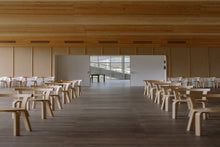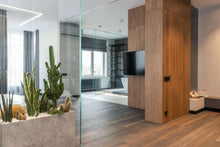Vinyl Flooring
- Regular price
- $0.00
- Sale price
- $0.00
- Regular price
-
- Unit price
- /per
Adding product to your cart
Vinyl flooring is one of the hottest flooring options on the market. Often compared to laminate flooring, vinyl is made from man-made materials to resemble natural sources like wood and stone.

Unlike laminate, vinyl flooring is a huge category with a plethora of different types, installations, constructions and, well, levels of awesome.
Vinyl flooring is available in planks, tiles and sheets/rolls. Each type has its own unique look and installation properties.
The most popular vinyl flooring option is vinyl plank flooring. These planks typically mimic the look of solid hardwood, offering a warm, inviting and expensive feel to your home.
Today’s luxury vinyl planks even offer the texture and character of trending hardwood options, including handscraped and wirebrushed looks.
One of the major benefits to choosing vinyl plank flooring is the easy, approachable, DIY installation. Most vinyl plank options come as interlocking or “floating” floors and simply click together, similar to laminate. Other DIY options include loose lay (the easiest – just lay your floor down and you’re done!) and peel and stick.
For high-traffic and commercial installation, you can always glue down your vinyl planks for a permanent solution.
Pros of Vinyl Plank Flooring
- Gorgeous wood looks: Luxury vinyl plank flooring mimics all the most popular colors and textures of solid hardwood. In fact, most people can’t even tell the two apart.
- Easy, DIY installation: Most vinyl planks offer an easy interlocking or “floating” installation, perfect for most homeowners to do on their own without the help of an installation professional.
- Comparable to laminate, engineered wood and hardwood: Other types of vinyl flooring can’t truly compare with long-standing industry leaders like laminate and wood. Vinyl planks totally can.
- Easy to maintain: Vinyl plank flooring is super easy to take care of. Most options are water-resistant and many are fully waterproof. Just make sure you choose a thick wear layer to prevent scrapes and scratches.
- Waterproof options: Yes, 100% waterproof. They are awesome!
Cons of Vinyl Plank Flooring
- Doesn’t feel like real wood: To the touch, vinyl feels pretty different from solid hardwood. This feel is important to some homeowners.
- Price: As you move onto waterproof and luxury options, this can run you more than other wood-look options like laminate. But they come with a whole lot more bells and whistles!
- Low-quality planks scratch and dent easily. If you want a vinyl plank that can stand up to high traffic, family and pets, you’ve got to go with a high-quality plank with a thick wear layer. The cheaper options just won’t hold up.
Vinyl Floor Tiles
Vinyl tiles, like traditional porcelain and ceramic tiles, often` mimic the look of natural stone. Like ceramic tile, vinyl tiles offer the beautiful look of popular stone flooring options (like marble) at a fraction of the price. And with way less maintenance!
Vinyl tiles, like vinyl planks, are quite approachable and DIY-friendly. Most vinyl tile options come as interlocking or “floating” floors and just click together, similar to laminate. Other DIY options include loose lay (the easiest – just lay your floor down and you’re done!) and peel and stick.
For high traffic and commercial installation, you can always glue down your vinyl floor tiles for a permanent solution.
- Choosing a selection results in a full page refresh.
- Press the space key then arrow keys to make a selection.






